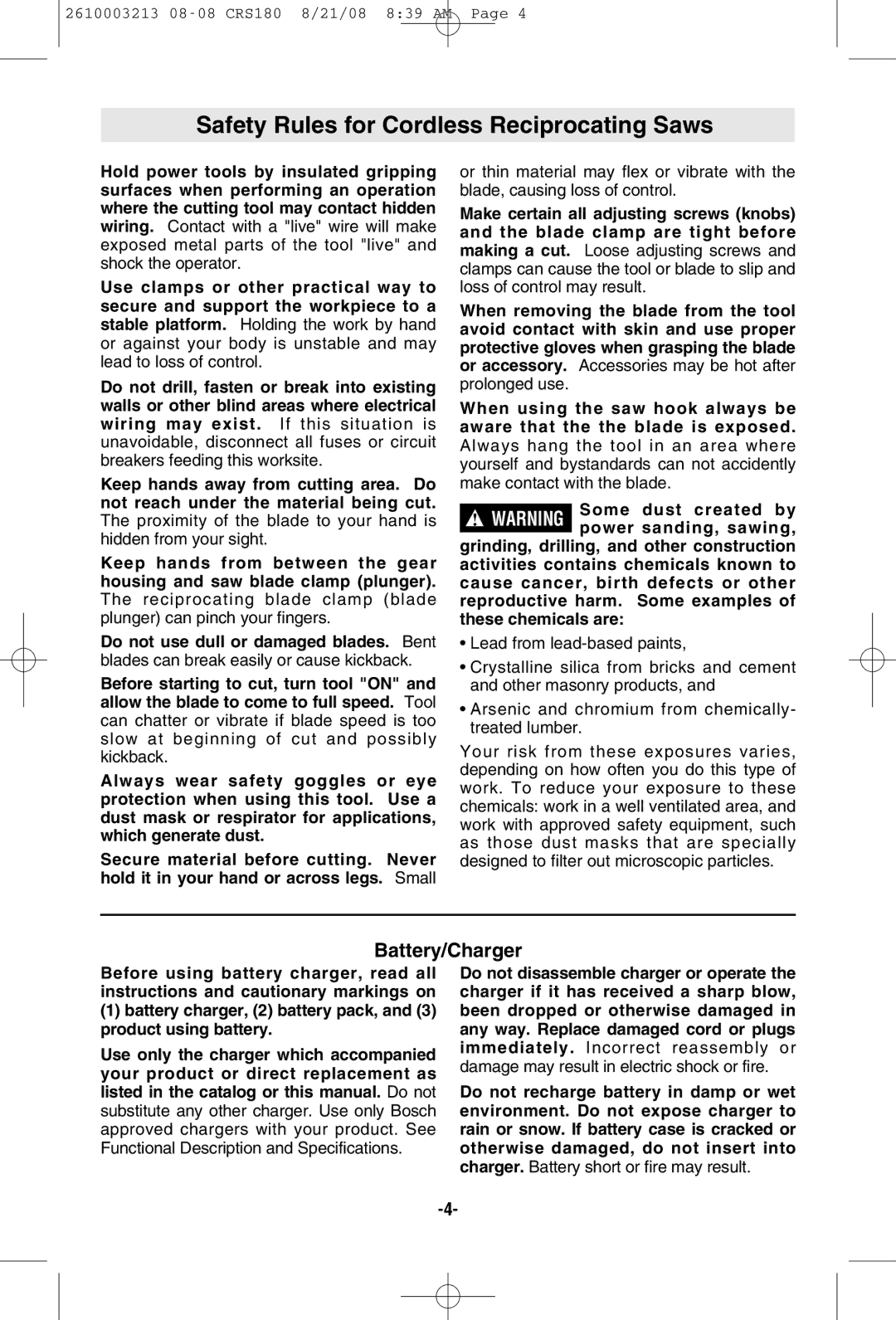
2610003213
Safety Rules for Cordless Reciprocating Saws
Hold power tools by insulated gripping surfaces when performing an operation where the cutting tool may contact hidden wiring. Contact with a "live" wire will make exposed metal parts of the tool "live" and shock the operator.
Use clamps or other practical way to secure and support the workpiece to a stable platform. Holding the work by hand or against your body is unstable and may lead to loss of control.
Do not drill, fasten or break into existing walls or other blind areas where electrical wiring may exist. If this situation is unavoidable, disconnect all fuses or circuit breakers feeding this worksite.
Keep hands away from cutting area. Do not reach under the material being cut.
The proximity of the blade to your hand is hidden from your sight.
Keep hands from between the gear housing and saw blade clamp (plunger).
The reciprocating blade clamp (blade plunger) can pinch your fingers.
Do not use dull or damaged blades. Bent blades can break easily or cause kickback.
Before starting to cut, turn tool "ON" and allow the blade to come to full speed. Tool can chatter or vibrate if blade speed is too slow at beginning of cut and possibly kickback.
Always wear safety goggles or eye protection when using this tool. Use a dust mask or respirator for applications, which generate dust.
Secure material before cutting. Never hold it in your hand or across legs. Small
or thin material may flex or vibrate with the blade, causing loss of control.
Make certain all adjusting screws (knobs) and the blade clamp are tight before making a cut. Loose adjusting screws and clamps can cause the tool or blade to slip and loss of control may result.
When removing the blade from the tool avoid contact with skin and use proper protective gloves when grasping the blade or accessory. Accessories may be hot after
prolonged use.
When using the saw hook always be aware that the the blade is exposed. Always hang the tool in an area where yourself and bystandards can not accidently make contact with the blade.
!Some dust created by WARNING power sanding, sawing,
grinding, drilling, and other construction activities contains chemicals known to cause cancer, birth defects or other reproductive harm. Some examples of these chemicals are:
•Lead from
•Crystalline silica from bricks and cement and other masonry products, and
•Arsenic and chromium from chemically- treated lumber.
Your risk from these exposures varies, depending on how often you do this type of work. To reduce your exposure to these chemicals: work in a well ventilated area, and work with approved safety equipment, such as those dust masks that are specially designed to filter out microscopic particles.
Battery/Charger
Before using battery charger, read all instructions and cautionary markings on
(1)battery charger, (2) battery pack, and (3) product using battery.
Use only the charger which accompanied your product or direct replacement as listed in the catalog or this manual. Do not substitute any other charger. Use only Bosch approved chargers with your product. See Functional Description and Specifications.
Do not disassemble charger or operate the charger if it has received a sharp blow, been dropped or otherwise damaged in any way. Replace damaged cord or plugs immediately. Incorrect reassembly or damage may result in electric shock or fire.
Do not recharge battery in damp or wet environment. Do not expose charger to rain or snow. If battery case is cracked or otherwise damaged, do not insert into charger. Battery short or fire may result.
